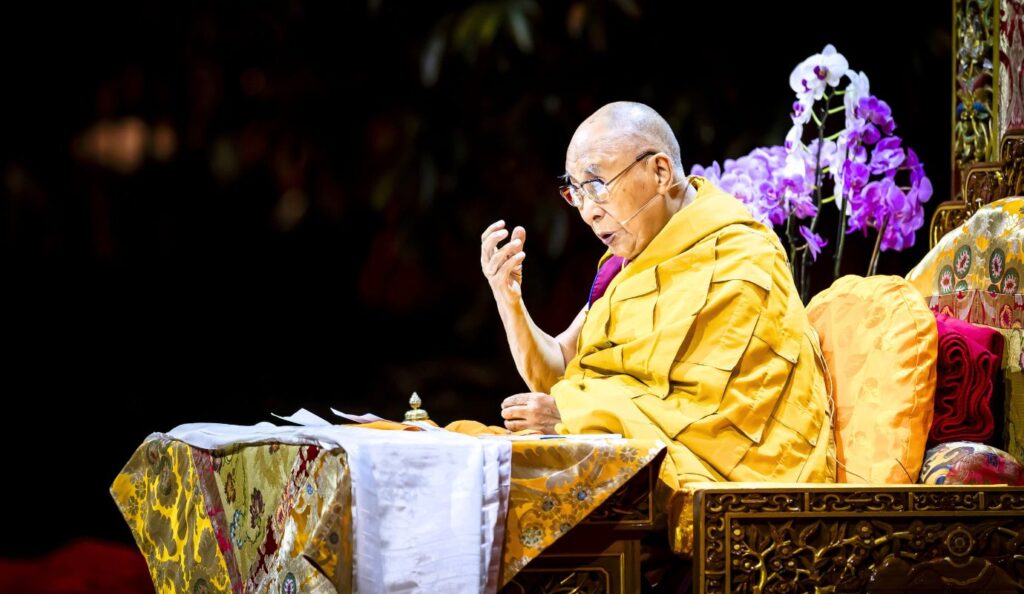The Dalai Lama will address a major three-day gathering of Buddhist leaders this week ahead of his 90th birthday. His followers expect the spiritual leader of Tibet to reveal critical details about his succession, a move expected to provoke strong reactions from China.
Tibetan tradition holds that the soul of a senior Buddhist monk reincarnates after death to continue the spiritual legacy. The 14th Dalai Lama, born as Lhamo Thondup on July 6, 1935, to a farming family in present-day Qinghai province, was recognized as such a reincarnation when he was just two years old.
The history and recognition of the current Dalai Lama
A search team sent by the Tibetan government made the decision based on various signs, including a vision revealed to a senior monk. The researchers were convinced when the infant recognized objects belonging to the 13th Dalai Lama with the phrase: “It’s mine, it’s mine.”
In the winter of 1940, he was taken to the Potala Palace in Lhasa, the capital of present-day Tibet Autonomous Region, and officially installed as the spiritual leader of Tibetans.
How the Dalai Lama’s successor will be chosen
In his book “Voice for the Voiceless,” published in March 2025, the Dalai Lama has stated that his successor will be born outside China. The Tibetan leader has lived in exile in northern India since 1959, after fleeing a failed uprising against Mao Zedong’s communist rule.
Speaking at a gathering in Dharamshala, the Dalai Lama said: “There will be some kind of framework within which we can talk about the continuation of the institution of the Dalai Lama.” He did not elaborate further on his intentions.
In a 2011 speech, the Dalai Lama also mentioned how exceptionally enlightened Buddhists can “manifest an incarnation before death.” Some experts have speculated this could mean he might train a successor during his lifetime, but Tibetan officials say this is unlikely.
The succession system and traditional procedures
The exile parliament says a system has been created for the exile government to continue its work, while officials from the Gaden Phodrang Foundation will be tasked with finding and recognizing the successor. The current Dalai Lama established the foundation in 2015 to “preserve and support the tradition and institution of the Dalai Lama.”
According to Tibetan Buddhist tradition, the search for reincarnation is carried out by designated priests who travel to Tibet to identify signs and omens.
The signs they look for include:
• The direction the Dalai Lama’s gaze was turned as he drew his last breath
• The path the smoke followed when his body was burned on the pyre
• The visions priests see when they visit the oracle lake Lhamo La-tso in Tibet
The priests focus more on children born on or shortly after the death of the previous hierarch. Once candidates are found, potential new Dalai Lamas undergo a series of tests until the chosen one is selected.
The dispute with China over succession
“Tibetans should freely elect their leader, the person to whom I can transfer my authority,” the Dalai Lama has stated, with China disagreeing with this position.
China says its leaders have the right to approve the Dalai Lama’s successor, as a legacy from imperial times. A selection ritual, in which the names of potential reincarnations are drawn from a golden urn, dates from 1793, during the Qing dynasty.
Chinese officials have repeatedly stated that the Dalai Lama’s reincarnation must be decided following national laws governing the use of the golden urn and reincarnations within China’s borders.
Many Tibetans claim that any Chinese role in the selection is a ploy to exert influence on the community. In his book, the Dalai Lama asked Tibetans not to accept “a candidate chosen for political purposes by anyone, including those in the People’s Republic of China.”
International reactions and geopolitical implications
Beijing considers the Dalai Lama, who left Tibet in 1959 after a failed uprising against Chinese rule, a separatist and says China will choose his successor. In March 2025, a spokesperson for the Chinese Foreign Ministry stated that the Dalai Lama is a political exile with “no right to represent the Tibetan people.”
Dolma Tsering Teykhang, deputy speaker of the Tibetan Parliament in Exile in Dharamshala, said it’s important for the world to hear directly from the Dalai Lama on the issue, because China “tries to defame him at every opportunity and they try to set rules for how the Dalai Lama’s reincarnation will be controlled by them.”
“China is trying to capture this institution for political purposes. We want the Dalai Lama’s reincarnation to be born not only for the survival of Tibet as a distinct culture, religion and nation, but for the welfare of all humanity.”
India is estimated to host more than 100,000 Tibetan Buddhists, who are free to study and work there. Many Indians respect the Dalai Lama, and international relations experts say his presence in India gives New Delhi a kind of leverage with rival China.
The United States, which faces increasing competition from China for global dominance, has repeatedly stated its commitment to promoting Tibetan human rights. American lawmakers have previously stated they will not allow China to influence the selection of the Dalai Lama’s successor.
In 2024, then-US President Joe Biden signed legislation pressuring Beijing to resolve the dispute over Tibet’s demands for greater autonomy.
With information from Reuters




